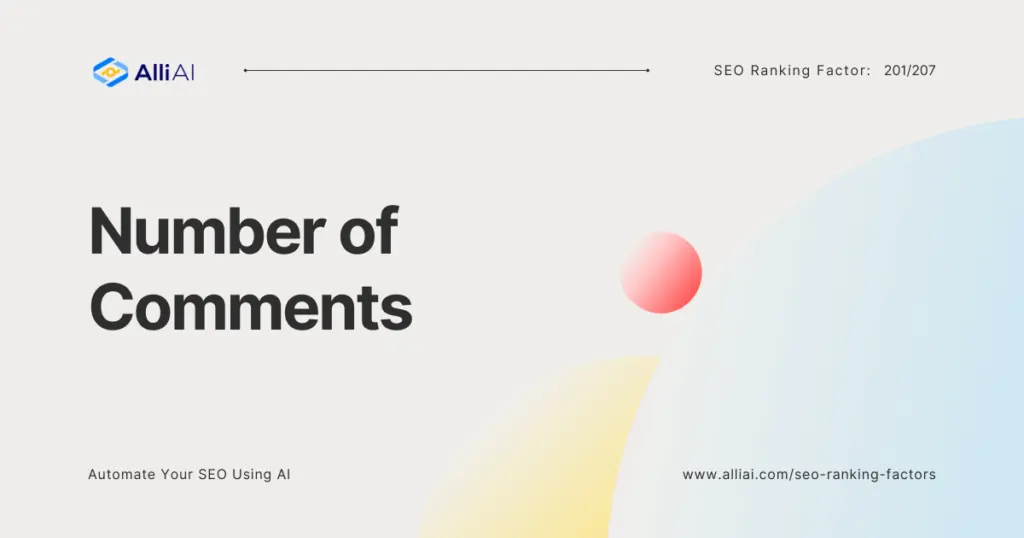What is the Ranking Factor?
When we talk about a ranking factor in SEO, we’re referring to the various elements that search engines, like Google, use to determine the order of search results. These can range from keywords and backlinks to site speed and mobile usability. Among these, the “Number of Comments” is a fascinating factor, often overlooked but crucial in the grand scheme of things.
The “Number of Comments” refers to the quantity of user-generated feedback or discussions occurring in the comments section of a web page. This factor is believed to contribute to a site’s freshness score and provides search engines with insights into the page’s engagement and content relevance.
Imagine you’re walking down a street looking for a place to eat. You see two restaurants: one bustling with people, laughter, and conversation, and the other quiet, with only a few patrons. Naturally, you’re drawn to the lively place, assuming the food must be good since it’s the popular choice. Search engines view web pages similarly; a page with active comments can be seen as a bustling restaurant, indicating quality content that engages and attracts visitors.
Why is the Number of Comments Important in SEO?
Comments can significantly impact your website’s SEO for multiple reasons. Firstly, they increase the content length on your page without additional effort from your side. More importantly, they keep the page content fresh, as each new comment is considered an update. Search engines love fresh content, which can improve your rankings. Furthermore, comments often include relevant keywords naturally, enhancing your page’s keyword density without risking keyword stuffing.
How the Number of Comments Affects SEO?
According to various SEO studies, pages with higher engagement, including comments, tend to perform better in search engine rankings. For instance, a study by Moz revealed that posts with a higher number of comments received significantly more backlinks, indicating that engagement correlates with other important SEO factors. Another report suggested that pages ranking in the top 10 results on Google had 38% more comments than those ranking lower, showcasing the indirect impact comments have on page authority and relevance.
By boosting user engagement and content freshness, comments can indirectly influence your page’s SEO performance. They can trigger higher click-through rates (CTR) from the search results, as users may perceive a page with numerous comments as more authoritative and informative.
FAQ
How can I encourage more comments on my blog posts?
Encouraging comments involves crafting engaging content that prompts reactions or opinions. Ending your posts with a question or a call-to-action (CTA) inviting readers to share their thoughts can significantly increase comment numbers. Additionally, actively participating in the comment section by replying to readers creates a community feel, encouraging more interactions.
Do bots or spam comments affect my SEO negatively?
Yes, bot-generated or spam comments can hurt your SEO. Search engines, especially Google, have become adept at identifying and penalizing manipulative practices. It’s essential to moderate your comments section and use anti-spam tools to maintain the quality of your site’s engagement.
Are comments more crucial for certain types of websites?
Comments can be particularly beneficial for blogs, news websites, and forums where user engagement is a key performance indicator. However, e-commerce sites can also benefit by allowing reviews and Q&A sections on product pages to increase engagement and provide additional value to users.
Conclusion
In the digital marketing realm, the importance of user engagement through comments should not be underestimated. While the direct impact of comments on SEO rankings might not be monumental, their indirect effects—such as enhanced page freshness, increased keyword density, and improved user engagement—are invaluable. Encouraging and managing a healthy comments section can significantly contribute to your SEO success, making your site more appealing to both search engines and potential visitors.
Always remember, SEO is not just about optimizing for search engines but also about improving the user experience and engagement on your site. Comments are a bridge that connects your content with your audience, making it a two-way interaction that can yield benefits beyond just rankings.






